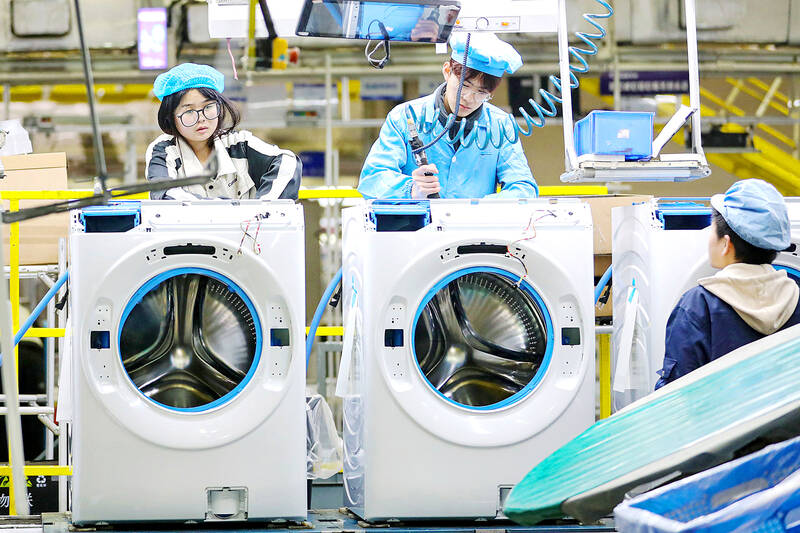Foreign businesses’ direct investment into China last year increased by the lowest amount since the early 1990s, underscoring challenges for the nation as Beijing seeks more overseas funds to help its economy.
China’s direct investment liabilities in its balance of payments was US$33 billion last year, data released on Sunday by the Chinese State Administration of Foreign Exchange showed.
That measure of new foreign investment into the country — which records monetary flows connected to foreign-owned entities in China — was 82 percent lower than the 2022 level and the lowest since 1993.

Photo: AFP
The data show the effect of COVID-19 lockdowns and weak recovery last year. In a first since 1998, the investment fell in the third quarter of last year, before recovering a bit to post growth in the final quarter.
The administration’s data, which gauge net flows, can reflect trends in foreign company profits, as well as changes in the size of their operations in China, economists say.
Profits of foreign industrial firms in China dropped 6.7 percent last year from the previous year, Chinese National Bureau of Statistics data showed.
Earlier figures from the Chinese Ministry of Commerce showed new foreign direct investment (FDI) into China fell last year to the lowest level in three years.
Those figures do not include reinvested earnings of existing foreign firms and are less volatile than the administration’s data, economists have said.
The government’s efforts to get overseas companies to return after COVID-19 are falling short, and more would be needed if Beijing is to succeed in its aims. The continuing weakness highlights how foreign companies are pulling money out of the country due to geopolitical tensions and higher interest rates elsewhere.
There is more incentive for multinationals to keep cash overseas rather than in China, because advanced economies have been raising interest rates when Beijing has been cutting them to stimulate the economy.
A recent survey of Japanese firms in China showed that most of those companies cut investment or kept it flat last year, and a majority do not have a positive outlook for this year.
Japanese companies added the least amount of net new money last year in at least a decade, with only 2.2 percent of new Japanese overseas investment going to China.
That was less than what was channeled into Vietnam or India and only about a quarter of the investment into Australia, data released earlier this month by the Japanese government showed.
Taiwanese firms have also become much more reluctant to add to their businesses in China, with new investment last year the lowest since 2001, government data showed last month.
Taiwanese companies have traditionally been among the biggest investors in China, but have been cutting new capital expenditure in the world’s second-largest economy since the peak in 2010.
South Korean firms also slashed investment into their close neighbor China last year, with new foreign direct investment dropping 91 percent in the first nine months of last year compared with the same period in 2022, falling to the lowest level since 2002.

Application-specific integrated circuit designer Faraday Technology Corp (智原) yesterday said that although revenue this quarter would decline 30 percent from last quarter, it retained its full-year forecast of revenue growth of 100 percent. The company attributed the quarterly drop to a slowdown in customers’ production of chips using Faraday’s advanced packaging technology. The company is still confident about its revenue growth this year, given its strong “design-win” — or the projects it won to help customers design their chips, Faraday president Steve Wang (王國雍) told an online earnings conference. “The design-win this year is better than we expected. We believe we will win

Intel Corp chief executive officer Lip-Bu Tan (陳立武) is expected to meet with Taiwanese suppliers next month in conjunction with the opening of the Computex Taipei trade show, supply chain sources said on Monday. The visit, the first for Tan to Taiwan since assuming his new post last month, would be aimed at enhancing Intel’s ties with suppliers in Taiwan as he attempts to help turn around the struggling US chipmaker, the sources said. Tan is to hold a banquet to celebrate Intel’s 40-year presence in Taiwan before Computex opens on May 20 and invite dozens of Taiwanese suppliers to exchange views

Chizuko Kimura has become the first female sushi chef in the world to win a Michelin star, fulfilling a promise she made to her dying husband to continue his legacy. The 54-year-old Japanese chef regained the Michelin star her late husband, Shunei Kimura, won three years ago for their Sushi Shunei restaurant in Paris. For Shunei Kimura, the star was a dream come true. However, the joy was short-lived. He died from cancer just three months later in June 2022. He was 65. The following year, the restaurant in the heart of Montmartre lost its star rating. Chizuko Kimura insisted that the new star is still down

While China’s leaders use their economic and political might to fight US President Donald Trump’s trade war “to the end,” its army of social media soldiers are embarking on a more humorous campaign online. Trump’s tariff blitz has seen Washington and Beijing impose eye-watering duties on imports from the other, fanning a standoff between the economic superpowers that has sparked global recession fears and sent markets into a tailspin. Trump says his policy is a response to years of being “ripped off” by other countries and aims to bring manufacturing to the US, forcing companies to employ US workers. However, China’s online warriors